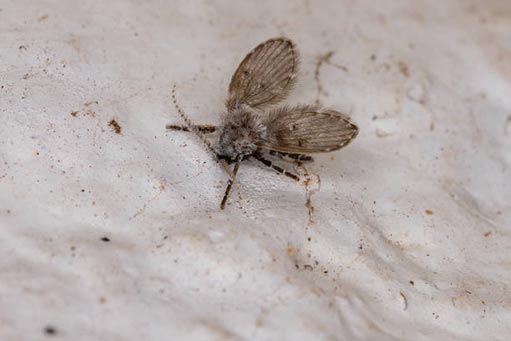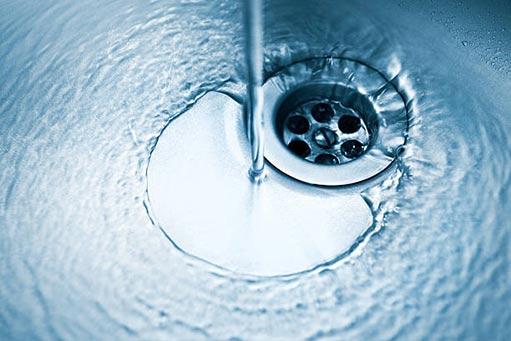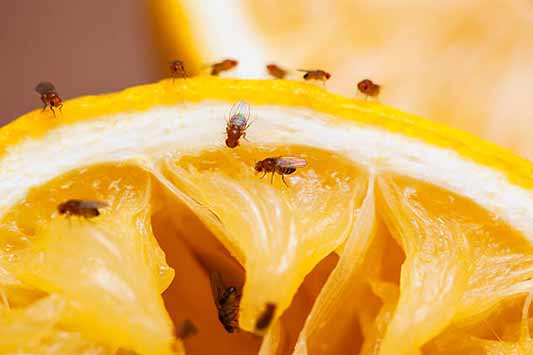
Drain flies, also known as sewer gnats or moth flies, can be a common nuisance in many households, including those in the Chicagoland area. These tiny insects are often found in bathrooms, kitchens, and other areas with standing water or moist conditions. While they do not pose any significant health risks, their presence can be bothersome and unhygienic.
Understanding Drain Flies
Before we get into how to get rid of drain flies, it’s essential to understand their biology and behavior. Drain flies are small, delicate insects with a moth-like appearance. They are typically gray or black in color, have fuzzy bodies, and disproportionately large wings. Despite their name, these flies do not originate from drains but rather from organic matter and stagnant water.
Drain flies lay their eggs in moist environments rich in organic material, such as in clogged drains that need cleaning, decaying vegetation, or sewage systems. The larvae of drain flies thrive in these environments, feeding on the organic matter present. After a brief pupal stage, adult drain flies emerge and start the cycle anew.
Identifying a Drain Fly Infestation
Identifying a drain fly infestation is relatively easy, as these insects are generally active during the daytime and can be seen hovering near drains, sinks, or other water sources. Additionally, if you notice tiny flies emerging when you run water down the drain or detect a foul, musty odor in your bathroom or kitchen, it’s likely you have a drain fly problem.
It’s crucial to differentiate drain flies from other flying insects, such as fruit flies or fungus gnats, as treatment methods may vary. Drain flies are typically larger than fruit flies and have a different appearance, making them distinguishable upon closer inspection.

Regularly clean and clear your drains to remove any organic matter that could attract drain flies.
Preventing Drain Fly Infestations
Preventing drain fly infestations is key to avoiding the hassle and frustration of dealing with these pests. Here are some preventative measures you can take:
- Keep drains clean: Regularly clean and clear your drains to remove any organic matter that could attract drain flies.
- Fix leaks promptly: Repair any leaks or dripping faucets that create moist environments, as these are attractive breeding grounds for drain flies.
- Remove standing water: Ensure that there is no standing water in your bathroom or kitchen. Dry wet surfaces thoroughly after use.
- Seal cracks and crevices: Inspect your plumbing system and seal any cracks or crevices that drain flies could use as entry points.
- Proper food storage: Seal food containers tightly and promptly dispose of any overripe fruits or vegetables.
Getting Rid of Drain Flies
If you already have a drain fly infestation, don’t worry—there are effective methods to eliminate these pests. Here are the steps you can take to get rid of drain flies:
1. Identify the breeding source:
The first step in eliminating drain flies is to locate their breeding source. This is typically a clogged drain or stagnant water area where organic matter accumulates. Inspect all drains in your home, including sinks, showers, and floor drains.
2. Clean the drains:
Once you’ve identified the breeding source, it’s time to clean the drains thoroughly. Use a drain brush or pipe cleaner to scrub the inside of the drains, removing any organic build-up that may be present.
3. Remove stagnant water:
If you have any stagnant water sources, such as unused toilets or potted plant trays, empty them immediately. Drain flies require standing water to breed, so removing these water sources can significantly reduce their population.
4. Apply drain cleaners:
After cleaning the drains, apply a commercial drain cleaner or homemade mixture of baking soda and vinegar. These solutions help break down any remaining organic matter and kill drain fly larvae.
5. Use drain fly traps:
Consider placing drain fly traps near infested drains to capture any adult flies that may emerge. These traps are commercially available or can be made using a container filled with apple cider vinegar and a few drops of dish soap.
6. Consult a professional:
If the infestation persists despite your best efforts, it may be necessary to contact a professional pest control company. They have the expertise and tools to effectively eliminate drain fly infestations.
Dealing with drain flies in Chicagoland can be frustrating, but by understanding their behavior and taking preventative measures, you can keep them at bay. Regular drain maintenance, proper sanitation, and prompt elimination of potential breeding sources are key to preventing and controlling drain fly infestations. Remember, if the problem persists, it’s always a good idea to seek professional assistance to ensure a fly-free environment in your home.


